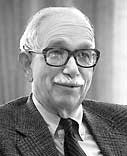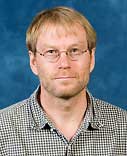Ronald Freedman, a leader in worldwide demographic research on fertility and family planning and the founder of the Population Studies Center at the Institute for Social Research (ISR), died Nov. 21 in Ann Arbor at the age of 90.

Freedman, who was the Roderick McKenzie Distinguished Professor Emeritus of Sociology, helped to shape the field of demography in the late in the 1940s when he advocated bringing a broader sociological perspective to the study of fertility and family planning. One of the first demographers to use sample surveys in his research, he also was among the first to ask women direct questions about their childbearing intentions and desires, and one of the first to recognize that desires and intentions often differed from actual behavior.
In a landmark 1959 volume, “Family Planning, Sterility, and Population Growth,” co-authored with Pascal Whelpton and Arthur Campbell, Freedman analyzed data from the first U.S. national survey on fertility and related behaviors. His work helped show that childbearing and family planning are influenced by the values and norms of society as well as by the social and economic conditions of individual families. In the early 1960s, Freedman shifted his interest from the United States to the developing world, where he helped to design effective family planning programs in Taiwan and other countries.
“Ronald Freedman was one of the leading social scientists of the last half of the 20th Century,” says sociologist Arland Thornton, director of the Population Studies Center.
Born in Winnipeg, Canada, Freedman grew up in Waukegan, Ill., a suburb of Chicago. He received a bachelor’s degree in history and economics from U-M in 1939 and his master’s degree in sociology from U-M in 1940. He went to the University of Chicago and completed prelims for his doctorate in sociology before joining the U.S. Army in 1942. He served in the Army Air Corps Weather Service, and four decades later, remarked, “When I talk about demography, I always apply what I learned as a weather forecaster — that is, don’t look out the window when you’re making a weather forecast. Short-run trends are not the significant thing.”
In 1946 he resumed work on his dissertation, receiving the doctorate in 1947. He also joined the faculty at U-M, where he remained throughout his career. In 1951, Freedman and Angus Campbell established the Detroit Area Study. Envisioned as a “laboratory for social scientists,” the study gave researchers and students an opportunity to design, collect and analyze data from the Detroit metro area. The study served as the basis for more than 400 articles and 20 books, and launched numerous careers.
In 1955 Freedman co-directed the Growth of American Families Survey, the first national scientific sample survey to include questions about fertility and family planning, and the precursor to the current U.S. National Survey of Family Growth. In 1960, the Population Council asked Freedman to collect similar data on fertility in a developing nation, and he began a series of surveys in Taiwan that provided invaluable information on fertility trends and their underlying social and economic dynamics. In 1961 he founded the Population Studies Center, now part of ISR.
Freedman received numerous awards and honors throughout his long career. Among them, he was elected President of the Population Association of America in 1964. In 1969 he received the Faculty Distinguished Service Award from U-M. In 1974 he was elected a member of the National Academy of Sciences. He received the Irene B. Taeuber Award in 1981 from the Population Association of America and the Office of Population Research. In 2002 he received the Laureate Award from the International Union for the Scientific Study of Population in recognition of lifetime contributions to the advancement of population sciences and distinguished service.
Freedman’s wife Deborah and his daughter Jane Davidson preceded him in death. He is survived by his companion Virginia Selin, son Joseph, daughter-in-law Maria, son-in-law Jeff Davidson, grandchildren Lily Davidson, Michael Davidson and Anna Freedman, brother Chuck (Lila), and many nieces and nephews.
Freedman’s colleagues and family are planning a memorial service for the near future.
Juha Heinonen
Professor of Mathematics Juha Heinonen died Oct. 30 after a battle with kidney cancer.
Born July 23, 1960, in the small town of Toivakka in central Finland, Heinonen was raised in the village’s old-age home where his mother served as the sole staff member. His father, Vilho, was a lumberjack and well-respected socialist politician for the tiny town. After graduating high school, Heinonen served one year as an officer in the Finnish army, and then enrolled as a student of mathematics at the University of Jyväskylä. His 1987 doctoral thesis, directed by Olli Martio, was in non-linear potential theory.

Heinonen first came to U-M in 1985 as a visiting graduate student for a semester. His first appointment in the Department of Mathematics began in 1988, when he returned as a three-year post-doctoral assistant professor. In 1992 he accepted a tenure track assistant professorship, and in 2000 he was promoted to professor. He served as associate chair for graduate studies in the Department of Mathematics from 2004-07.
Heinonen was a leading figure in geometric function theory, his main research area. His two books “Nonlinear Potential Theory of Degenerate Elliptic Equations” (co-authored with T. Kilpeläinen and O. Martio) and “Analysis on Metric Spaces” have become standard references in their fields. He co-authored more than 60 research papers, many of which contributed to the creation of a new branch of mathematics, now called analysis on metric spaces.
Heinonen’s expertise was recognized with many awards and fellowships, including a Sloan Fellowship, numerous NSF grants, several visiting appointments and an Excellence in Research Award from U-M. For seven years he was an editor of the Proceedings of the American Mathematical Society. In 2002 he was invited to give a talk at the International Congress of Mathematicians in Beijing. Heinonen became a member of the Finnish Academy of Science and Letters in 2004.
A dedicated thesis advisor, Heinonen directed eight doctoral students. Many students, junior faculty and young researchers greatly benefited from his patient mentorship and wise tutelage, colleagues say. Heinonen often said he was very grateful for the excellent mentoring he himself received as a young mathematician, and was happy to repay in kind. In addition to his advisor, he especially acknowledged Professor Emeritus Fred Gehring, whom he met in 1985, and Jose Fernandez, to whom Gehring introduced him later that academic year at the Mathematical Sciences Research Institute in Berkeley. He was deeply influenced by Dennis Sullivan, who directed his attention to analysis in more abstract settings.
When Heinonen originally came to the United States, his intention was to stay for a short period. His plans changed when he met his future wife, Karen Smith, a first-year graduate student of mathematics, who also arrived in Ann Arbor in the fall of 1988. They married in 1991. Heinonen put his career on hold to follow his wife to Boston when she obtained a post-doctoral position at the Massachusetts Institute of Technology. In 1996 the couple came back to Ann Arbor as tenured professors. They welcomed their daughter Sanelma in 1998, and their twins, Tapio and Helena, in 2003.
A gifted athlete, Heinonen was the 1976 Finnish national champion in his class for 5 kilometer cross-country skiing. Although he gave up professional sports to pursue a career in mathematics in the early 1980s, Heinonen’s love of competitive sports never waned. He participated in many running, cross-country skiing and orienteering events around the country. In his class he won both the U.S. and the North American gold medal in orienteering in 2000.
Heinonen spent his free time studying foreign languages, or reading history, biographies and political commentary. He loved the outdoors, particularly Michigan autumns and Finnish winters.
Heinonen is survived by his mother Liisa Heinonen and his sister Maritta Nukarinen. A memorial service will be held at 2 p.m. Dec. 9 in the Michigan League Ballroom. The Department of Mathematics has established the Juha Heinonen Memorial Graduate Student Fellowship. Information is available at http://www.math.lsa.umich.edu/events/juhaMem.html.
— Submitted by Suzanne H. Rogers, Department of Mathematics

